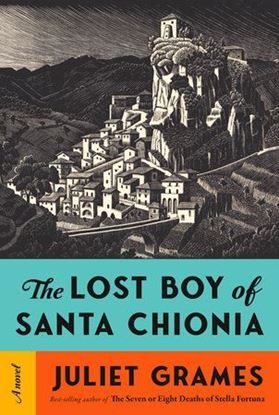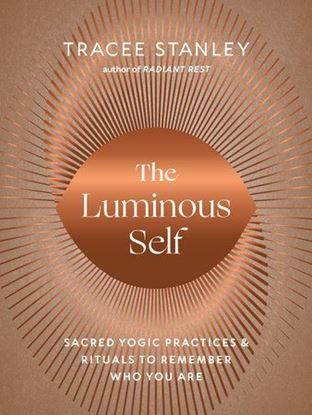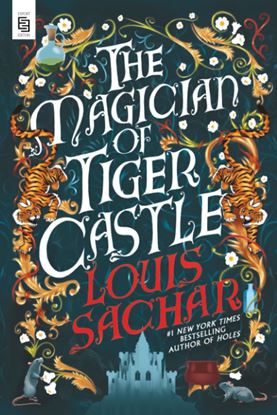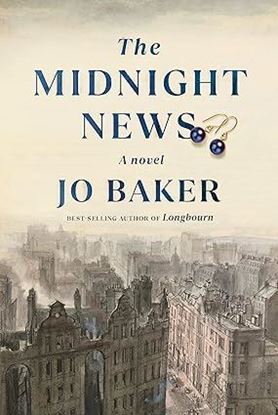

THE LORD OF THE RINGS. PART. 2 (MM)
The second part of J.R.R. Tolkien’s epic adventure The Lord of the Rings.
The Fellowship is scattered. Some brace hopelessly for war against the ancient evil of Sauron. Others must contend with the treachery of the wizard Saruman. Only Frodo and Sam are left to take the One Ring, ruler of the accursed Rings of Power, to be destroyed in Mordor, the dark realm where Sauron is supreme. Their guide is Gollum, deceitful and obsessive slave to the corruption of the Ring.
650
THE LOST BOY OF SANTA CHIONIA
Calabria, 1960. Francesca Loftfield, a twenty-seven-year-old, starry-eyed American, arrives in the isolated mountain village of Santa Chionia tasked with opening a nursery school. There is no road, no doctor, no running water or electricity. And thanks to a recent flood that swept away the post office, there’s no mail, either.
Most troubling, though, is the human skeleton that surfaced after the flood waters receded. Who is it? And why don’t the police come and investigate? When the local priest’s housekeeper begs Francesca to help determine if the remains are those of her long-missing son, Francesca begins to ask a lot of inconvenient questions. As an outsider, she might be the only person who can uncover the truth. Or she might be getting in over her head. As she attempts to juggle a nosy landlady, a suspiciously dashing shepherd, and a network of local families bound together by a code of silence, Francesca finds herself forced to choose between the charitable mission that brought her to Santa Chionia, and her future happiness, between truth and survival.
Set in the wild heart of Calabria, a land of sheer cliff faces, ancient tradition, dazzling sunlight—and one of the world’s most ruthless criminal syndicates—The Lost Boy of Santa Chionia is a suspenseful puzzle mystery, a captivating romance, and an affecting portrait of a young woman in search of a meaningful life.
1,450
THE LUMINOUS SELF
The Luminous Self shares teachings and practices that can help us connect with our true Self and reclaim our inherent power and wisdom—essential for living with purpose and grace in our turbulent world. In this book, Tracee Stanley shares teachings and practices in each chapter—including meditation, yoga nidra, breath work, dreaming rituals, community care practices, journaling, and more—that can help us remember and honor our deepest Self.
The book is a journey of inner exploration for anyone who desires to know themselves more deeply. Chapters introduce different paths to personal discernment—including facing obstacles to liberation, forgiveness, the power of memory, transitions as portals to wisdom and devotion, and nature as a teacher—and include stories from Stanley’s life, teachings, and practice.
1,400
THE MAGICIAN OF TIGER CASTLE
Long ago and far away (and somewhere south of France) lies the kingdom of Esquaveta. There, Princess Tullia is in nearly as much peril as her struggling kingdom. Esquaveta desperately needs to forge an alliance, and to that end, Tullia's father has arranged a marriage between her and an odious prince. However, one month before the "wedding of the century," Tullia falls in love with a lowly apprentice scribe.
The king turns to Anatole, his much-maligned magician. Seventeen years earlier, when Anatole first came to the castle, he was regarded as something of a prodigy. But after a long series of failures—the latest being an attempt to transform sand into gold—he has become the object of contempt and ridicule. The only one who still believes in him is the princess.
When the king orders Anatole to brew a potion that will ensure Tullia agrees to the wedding, Anatole is faced with an impossible choice. With one chance to save the marriage, the kingdom, and, of most importance to him, his reputation, will he betray the princess—or risk ruin?
1,400
THE MARTIAN (EXPORT)
When a dust storm forces his crew to evacuate the planet while thinking him dead, astronaut Mark Watney finds himself stranded on Mars’s surface, completely alone. Armed with nothing but his ingenuity, his engineering skills – and a gallows sense of humor that proves to be his greatest source of strength – Mark embarks on a dogged quest to stay alive. But will his resourcefulness be enough to overcome the impossible odds against him?
750
THE MIDNIGHT NEWS
It is 1940 and twenty-year-old Charlotte Richmond watches from her attic window as enemy planes fly over London. Still grieving her beloved brother, who never returned from France, she is trying to keep herself out of trouble: holding down a typist job at the Ministry of Information, sharing gin and confidences with her best friend, Elena, and dodging her overbearing father.
On her way to work she often sees the boy who feeds the birds—a source of unexpected joy amid the rubble of the Blitz. But every day brings new scenes of devastation, and after yet another heartbreaking loss Charlotte has an uncanny sense of foreboding. Someone is stalking the darkness, targeting her friends. And now he’s following her.
As grief and suspicion consume her, Charlotte’s nerves become increasingly frayed. She no longer knows whom to trust. She can’t even trust herself . . .
995













